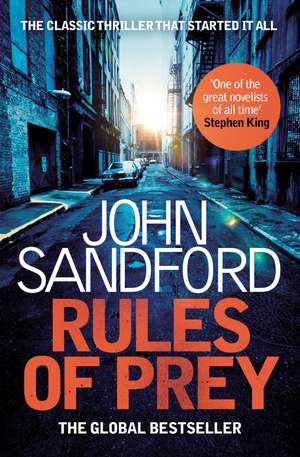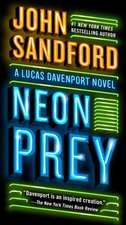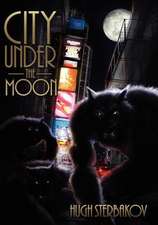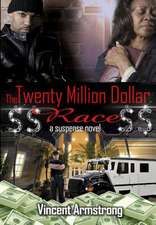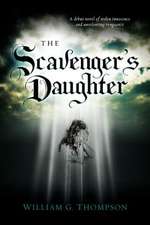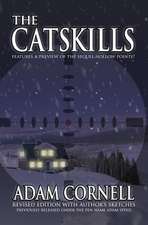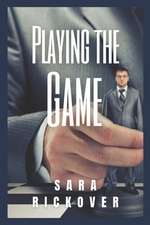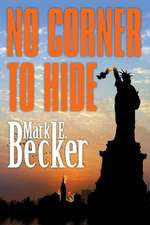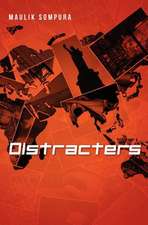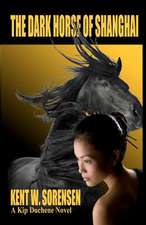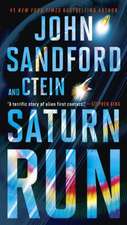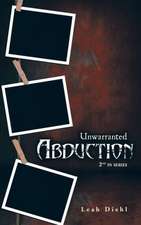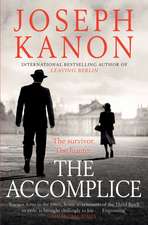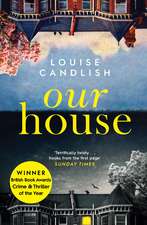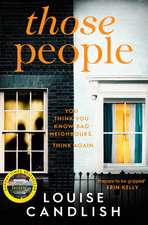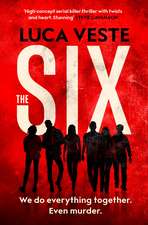Rules of Prey: Lucas Devenport, cartea 1
Autor John Sandforden Limba Engleză Paperback – 29 noi 2018
The killer was mad but brilliant.
He left notes with every woman he killed. Rules of murder: Never have a motive. Never follow a discernible pattern. Never carry a weapon after it has been used...So many rules to his sick, violent games of death.
But Lucas Davenport, the cop who’s out to get him, isn’t playing by the rules.
***Praise for RULES OF PREY***
'Terrifying... Sandford has crafted the kind of trimmed-to-the-bone thriller that is hard to put down… scary... intriguing... unpredictable' —Chicago Tribune
'Rules of Prey is so chilling that you’re almost afraid to turn the pages. So mesmerizing you cannot stop... A crackle of surprises' —*Carl Hiaasen
'Sleek and nasty... A big scary, suspenseful read, and I loved every minute of it' —Stephen King
'A cop and a killer you will remember for a long, long time' —Robert B. Parker
| Toate formatele și edițiile | Preț | Express |
|---|---|---|
| Paperback (2) | 48.11 lei 22-34 zile | +29.38 lei 6-12 zile |
| Simon&Schuster – 29 noi 2018 | 48.11 lei 22-34 zile | +29.38 lei 6-12 zile |
| G.P. Putnam's Sons – 31 iul 2005 | 64.50 lei 3-5 săpt. |
Preț: 48.11 lei
Preț vechi: 64.55 lei
-25% Nou
9.21€ • 9.60$ • 7.65£
Carte disponibilă
Livrare economică 28 februarie-12 martie
Livrare express 12-18 februarie pentru 39.37 lei
Specificații
ISBN-10: 1471179036
Pagini: 448
Dimensiuni: 130 x 198 x 27 mm
Greutate: 0.31 kg
Editura: Simon&Schuster
Colecția Simon & Schuster UK
Seria Lucas Devenport
Descriere
#1 New York Times bestselling author John Sandford's 'haunting, unforgettable, ice-blooded thriller'* - first in the Lucas Davenport series!
The killer was mad but brilliant.
He left notes with every woman he killed. Rules of murder: Never have a motive. Never follow a discernible pattern. Never carry a weapon after it has been used...So many rules to his sick, violent games of death.
But Lucas Davenport, the cop who’s out to get him, isn’t playing by the rules.
***Praise for RULES OF PREY***
'Terrifying... Sandford has crafted the kind of trimmed-to-the-bone thriller that is hard to put down… scary... intriguing... unpredictable' —Chicago Tribune
'Rules of Prey is so chilling that you’re almost afraid to turn the pages. So mesmerizing you cannot stop... A crackle of surprises' —*Carl Hiaasen
'Sleek and nasty... A big scary, suspenseful read, and I loved every minute of it' —Stephen King
'A cop and a killer you will remember for a long, long time' —Robert B. Parker
Recenzii
Sleek and nasty...a big, scary suspenseful read. (Stephen King)
Extras
A rooftop billboard cast a flickering blue light through the studio windows. The light ricocheted off glass and stainless steel: an empty crystal bud vase rimed with dust, a pencil sharpener, a microwave oven, peanut-butter jars filled with drawing pencils, paintbrushes and crayons. An ashtray full of pennies and paper clips. Jars of poster paint. Knives. A stereo was dimly visible as a collection of rectangular silhouettes on the window ledge. A digital clock punched red electronic minutes into the silence.
The maddog waited in the dark.
He could hear himself breathe. Feel the sweat trickle from the pores of his underarms. Taste the remains of his dinner. Feel the shaven stubble at his groin. Smell the odor of the Chosen’s body.
He was never so alive as in the last moments of a long stalk. For some people, for people like his father, it must be like this every minute of every hour: life on a higher plane of existence.
The maddog watched the street. The Chosen was an artist. She had smooth olive skin and liquid brown eyes, tidy breasts and a slender waist. She lived illegally in the warehouse, bathing late at night in the communal rest room down the hall, furtively cooking microwave meals after the building manager left for the day. She slept on a narrow bed in a tiny storage room, beneath an art-deco crucifix, immersed in vapors of turpentine and linseed. She was out now, shopping for microwave dinners. The microwave crap would kill her if he didn’t, the maddog thought. He was probably doing her a favor. He smiled.
The artist would be his third kill in the Cities, the fifth of his life.
The first was a ranch girl, riding out of her back pasture toward the wooded limestone hills of East Texas. She wore jeans, a red-and-white-checked shirt, and cowboy boots. She sat high in a western saddle, riding more with her knees and her head than with the reins in her hand. She came straight into him, her single blonde braid bouncing behind.
The maddog carried a rifle, a Remington Model 700 ADL in .270 Winchester. He braced his forearm against a rotting log and took her when she was forty yards out. The single shot penetrated her breastbone and blew her off the horse.
That was a killing of a different kind. She had not been Chosen; she had asked for it. She had said, three years before the killing, in the maddog’s hearing, that he had lips like red worms. Like the twisting red worms that you found under river rocks. She said it in the hall of their high school, a cluster of friends standing around her. A few glanced over their shoulders at the maddog, who stood fifteen feet away, alone, as always, pushing his books onto the top shelf of his locker. He gave no sign that he’d overheard. He had been very good at concealment, even in his youngest days, though the ranch girl didn’t seem to care one way or another. The maddog was a social nonentity.
But she paid for her careless talk. He held her comment to his breast for three years, knowing his time would come. And it did. She went off the back of the horse, stricken stone-cold dead by a fast-expanding copper-jacketed hunting bullet.
The maddog ran lightly through the woods and across a low stretch of swampy prairie. He dumped the gun beneath a rusting iron culvert where a road crossed the marsh. The culvert would confuse any metal detector used to hunt for the weapon, although the maddog didn’t expect a search—it was deer season and the woods were full of maniacs from the cities, armed to the teeth and ready to kill. The season, the weapon cache, had all been determined far in advance. Even as a sophomore in college, the maddog was a planner.
He went to the girl’s funeral. Her face was untouched and the top half of the coffin was left open. He sat as close as he could, in his dark suit, watched her face and felt the power rising. His only regret was that she had not known that death was coming, so that she might savor the pain; and that he had not had time to enjoy its passage.
The second killing was the first of the truly Chosen, although he no longer considered it a work of maturity. It was more of . . . an experiment? Yes. In the second killing, he remedied the deficiencies of the first.
She was a hooker. He took her during the spring break of his second year, the crisis year, in law school. The need had long been there, he thought. The intellectual pressure of law school compounded it. And one cool night in Dallas, with a knife, he earned temporary respite on the pale white body of a Mississippi peckerwood girl, come to the city to find her fortune.
The ranch girl’s shooting death was lamented as a hunting accident. Her parents grieved and went on to other things. Two years later the maddog saw the girl’s mother laughing outside a concert hall.
The Dallas cops dismissed the hooker’s execution as a street killing, dope-related. They found Quaaludes in her purse, and that was good enough. All they had was a street name. They put her in a pauper’s grave with that name, the wrong name, on the tiny iron plaque that marked the place. She had never seen her sixteenth year.
The two killings had been satisfying, but not fully calculated. The killings in the Cities were different. They were meticulously planned, their tactics based on a professional review of a dozen murder investigations.
The maddog was intelligent. He was a member of the bar. He derived rules.
Never kill anyone you know.
Never have a motive.
Never follow a discernible pattern.
Never carry a weapon after it has been used.
Isolate yourself from random discovery.
Beware of leaving physical evidence.
There were more. He built them into a challenge.
He was mad, of course. And he knew it.
In the best of worlds, he would prefer to be sane. Insanity brought with it a large measure of stress. He had pills now, black ones for high blood pressure, reddish-brown ones to help him sleep. He would prefer to be sane, but you played the hand you were dealt. His father said so. The mark of a man.
So he was mad.
But not quite the way the police thought.
He bound and gagged the women and raped them.
The police considered him a sex freak. A cold freak. He took his time about the killings and the rapes. They believed he talked to his victims, taunted them. He carefully used prophylactics. Lubricated prophylactics. Postmortem vaginal smears on the first two Cities victims produced evidence of the lubricant. Since the cops never found the rubbers, they assumed he took them with him.
Consulting psychiatrists, hired to construct a psychological profile, believed the maddog feared women. Possibly the result of a youthful life with a dominant mother, they said, a mother alternately tyrannical and loving, with sexual overtones. Possibly the maddog was afraid of AIDS, and possibly—they talked of endless possibilities—he was essentially homosexual.
Possibly, they said, he might do something with the semen he saved in the prophylactics. When the shrinks said that, the cops looked at each other. Do something? Do what? Make Sno-Cones? What?
The psychiatrists were wrong. About all of it.
He did not taunt his victims, he comforted them; helped them to participate. He didn’t use the rubbers primarily to protect himself from disease, but to protect himself from the police. Semen is evidence, carefully collected, examined, and typed by medical investigators. The maddog knew of a case where a woman was attacked, raped, and killed by one of two panhandlers. Each man accused the other. A sementyping was pivotal in isolating the killer.
The maddog didn’t save the rubbers. He didn’t do something with them. He flushed them, with their evidentiary load, down his victims’ toilets.
Nor was his mother a tyrant.
She had been a small unhappy dark-haired woman who wore calico dresses and wide-brimmed straw hats in the summertime. She died when he was in junior high school. He could barely remember her face, though once, when he was idly going through family boxes, he came across a stack of letters addressed to his father and tied with a ribbon. Without knowing quite why, he sniffed the envelopes and was overwhelmed by the faint, lingering scent of her, a scent like old wild-rose petals and the memories of Easter lilacs.
But she was nothing.
She never contributed. Won nothing. Did nothing. She was a drag on his father. His father and his fascinating games, and she was a drag on them. He remembered his father shouting at her once, I’m working, I’m working, and you will stay out of this room when I am working, I have to concentrate and I cannot do it if you come in here and whine, whine . . . The fascinating games played in courts and jailhouses.
The maddog was not homosexual. He was attracted only to women. It was the only thing that a man could do, the thing with women. He lusted for them, seeing their death and feeling himself explode as one transcendent moment.
In moments of introspection, the maddog had rooted through his psyche, seeking the genesis of his insanity. He decided that it had not come all at once, but had grown. He remembered those lonely weeks of isolation on the ranch with his mother, while his father was in Dallas playing his games. The maddog would work with his .22 rifle, sniping the ground squirrels. If he hit a squirrel just right, hit it in the hindquarters, rolled it away from its hole, it would struggle and chitter and try to claw its way back to the nest, dragging itself with its front paws. All the other ground squirrels, from adjacent holes, would stand on the hills of sand they’d excavated from their dens and watch. Then he could pick off a second one, and that would bring out more, and then a third, until an entire colony was watching a half-dozen wounded ground squirrels trying to drag themselves back to their nests.
He would wound six or seven, shooting from a prone position, then stand and walk over to the nests and finish them with his pocketknife. Sometimes he skinned them out alive, whipping off their hides while they struggled in his hands. After a while, he began stringing their ears, keeping the string in the loft of a machine shed. At the end of one summer, he had more than three hundred sets of ears.
He had the first orgasm of his young life as he lay prone on the edge of a hayfield sniping ground squirrels. The long spasm was like death itself. Afterward he unbuttoned his jeans and pulled open the front of his underwear to look at the wet semen stains and he said to himself, “Boy, that did it . . . boy, that did it.” He said it over and over, and after that, the passion came more often as he hunted over the ranch.
Suppose, he thought, that it had been different. Suppose that he’d had playmates, girls, and they had gone to play doctor out in one of the sheds. You show me yours, I’ll show you mine. . . . Would that have made all the difference? He didn’t know. By the time he was fourteen, it was too late. His mind had been turned.
A girl lived a mile down the road. She was five or six years older than he. Daughter of a real rancher. She rode by on a hayrack once, her mother towing it with a tractor, the girl wearing a sweat-soaked T-shirt that showed her nipples puckered against the dirty cloth. The maddog was fourteen and felt the stirring of a powerful desire and said aloud, “I would love her and kill her.”
He was mad.
When he was in law school he read about other men like himself, fascinated to learn that he was part of a community. He thought of it as a community, of men who understood the powerful exaltation of that moment of ejaculation and death.
But it was not just the killing. Not anymore. There was now the intellectual thrill.
The maddog had always loved games. The games his father played, the games he played alone in his room. Fantasy games, role-playing games. He was good at chess. He won the high-school chess tournament three years running, though he rarely played against others outside the tournaments.
But there were better games. Like those his father played. But even his father was a surrogate for the real player, the other man at the table, the defendant. The real players were the defendants and the cops. The maddog knew he could never be a cop. But he could still be a player.
And now, in his twenty-seventh year, he was approaching his destiny. He was playing and he was killing, and the joy of the act made his body sing with pleasure.
The ultimate game. The ultimate stakes.
He bet his life that they could not catch him. And he was winning the lives of women, like poker chips. Men always played for women; that was his theory. They were the winnings in all the best games.
Cops, of course, weren’t interested in playing. Cops were notoriously dull.
To help them grasp the concept of the game, he left a rule with each killing. Words carefully snipped from the Minneapolis newspaper, a short phrase stuck with Scotch Magic tape to notebook paper. For the first Cities kill, it was Never kill anyone you know.
That puzzled them sorely. He placed the paper on the victim’s chest, so there could be no doubt about who had left it there. As an almost jocular afterthought, he signed it: maddog.
The second one got Never have a motive. With that, they would have known they were dealing with a man of purpose.
Though they must have been sweating bullets, the cops kept the story out of the papers. The maddog yearned for the press. Yearned to watch his legal colleagues follow the course of the investigation in the daily news. To know that they were talking to him, about him, never knowing that he was the One.
It thrilled him. This third collection should do the trick. The cops couldn’t suppress the story forever. Police departments normally leaked like colanders. He was surprised they’d kept the secret this long.
This third one would get Never follow a discernible pattern. He left the sheet on a loom.
There was a contradiction here, of course. The maddog was an intellectual and he had considered it. He was careful to the point of fanaticism: he would leave no clues. Yet, he deliberately created them. The police and their psychiatrists might deduce certain things about his personality from his choice of words. From the fact that he made rules at all. From the impulse to play.
But there was no help for that.
If killing were all that mattered, he didn’t doubt that he could do it and get away with it. Dallas had demonstrated that. He could do dozens. Hundreds. Fly to Los Angeles, buy a knife at a discount store, kill a hooker, fly back home the same night. A different city every week. They would never catch him. They would never even know.
There was an attraction to the idea, but it was, ultimately, intellectually sterile. He was developing. He wanted the contest. Needed it.
The maddog shook his head in the dark and looked down from the high window. Cars hissed by on the wet street. There was a low rumble from I-94, two blocks to the north. Nobody on foot. Nobody carrying bags.
He waited, pacing along the windows, watching the street. Eight minutes, ten minutes. The intensity was growing, the pulsing, the pressure. Where was she? He needed her.
Then he saw her, crossing the street below, her dark hair bobbing in the mercury-vapor lights. She was alone, carrying a single grocery bag. When she passed out of sight directly below him, he moved to the central pillar and stood against it.
The maddog wore jeans, a black T-shirt, latex surgeon’s gloves, and a blue silk ski mask. When she was tied to the bed and he had stripped himself, the woman would find that her attacker had shaven: he was as clean of pubic hair as a five-year-old. Not because he was kinky, although it did feel . . . interesting. But he had seen a case in which lab specialists recovered a half-dozen pubic hairs from a woman’s couch and matched them with samples from the assailant. Got the samples from the assailant with a search warrant. Nice touch. Upheld on appeal.
He shivered. It was chilly. He wished he had worn a jacket. When he left his apartment, the temperature was seventy-five. It must have fallen fifteen degrees since dark. Goddamn Minnesota.
The maddog was not large or notably athletic. For a brief time in his teens he thought of himself as lean, although his father characterized him as slight. Now, he would concede to a mirror, he was puffy. Five feet ten inches tall, curly red hair, the beginnings of a double chin, a roundness to the lower belly . . . lips like red worms. . . .
The elevator was old and intended for freight. It groaned once, twice, and started up. The maddog checked his equipment: The Kotex that he would use as a gag was stuffed in his right hip pocket. The tape that he would use to bind the gag was in his left. The gun was tucked in his belt, under the T-shirt. The pistol was small but ugly: a Smith &Wesson Model 15 revolver. He’d bought it from a man who was about to die and then did. Before he died, when he offered it for sale, the dying man said his wife wanted him to keep it for protection. He asked the maddog not to mention that he had purchased it. It would be their secret.
And that was perfect. Nobody knew he had the gun. If he ever had to use it, it would be untraceable, or traceable only to a dead man.
He took the gun out and held it by his side and thought of the sequence: grab, gun in face, force on floor, slap her with the pistol, kneel on back, pull head back, stuff Kotex in mouth, tape, drag to bed, tape arms to the headboard, feet to baseboard.
Then relax and shift to the knife.
The elevator stopped and the doors opened. The maddog’s stomach tightened, a familiar sensation. Pleasant, even. Footsteps. Key in the door. His heart was pounding. Door open. Lights. Door closed. The gun was hot in his hand, the grip rough. The woman passing . . . The maddog catapulted from his hiding place.
Saw in an instant that she was alone.
Wrapped her up, the gun beside her face.
The grocery bag burst and red-and-white cans of Campbell’s soup clattered down the wooden floor like dice, beige-and-red packages of chicken nibbles and microwave lasagna crunched underfoot.
“Scream,” he said in his roughest voice, well-practiced with a tape recorder, “and I’ll kill you.”
Unexpectedly, the woman relaxed against him and the maddog involuntarily relaxed with her. An instant later, the heel of her foot smashed onto his instep. The pain was unbearable and as he opened his mouth to scream, she turned in his arms, ignoring the gun.
“Aaaiii,” she said, a low half-scream, half-cry of fear.
Time virtually stopped for them, the seconds fragmenting into minutes. The maddog watched her hand come up and thought she had a gun and felt his own gun hand traveling away from her body, the wrong way, and thought, “No.” He realized in the next crystalline fragment of time that she was not holding a gun, but a thin silver cylinder.
She hit him with a blast of Mace and the time stream lurched crazily into fast-forward. He screeched and swatted her with the Smith and lost it at the same time. He swung his other hand and, more from luck than skill, connected with the side of her jaw and she fell and rolled.
The maddog looked for the gun, half-blinded, his hands to his face, his lungs not working as they should— he had asthma, and the Mace was soaking through the ski mask—and the woman was rolling and coming up with the Mace again and now she was screaming:
“Asshole, asshole . . .”
He kicked at her and missed and she sprayed him again and he kicked again and she stumbled and was rolling and still had the Mace and he couldn’t find the gun and he kicked at her again. Lucky again, he connected with her Mace hand and the small can went flying. Blood was pouring from her forehead where it had been raked by the front sight on the pistol, streaming from the ragged cut down over her eyes and mouth, and it was on her teeth and she was screaming:
“Asshole, asshole.”
Before he could get back on the attack, she picked up a shiny stainless-steel pipe and swung it at him like a woman who’d spent time in the softball leagues. He fended her off and backed away, still looking for the gun, but it was gone and she was coming and the maddog made the kind of decision he was trained to make.
He ran.
He ran and she ran behind him and hit him once more on the back and he half-stumbled and turned and hit her along the jaw with the bottom of his fist, a weak, ineffective punch, and she bounced away and came back with the pipe, her mouth open, her teeth showing, showering him with saliva and blood as she screamed, and he made it through the door and jerked it shut behind him.
“. . . asshole . . .”
Down the hall to the stairs, almost strangling in the mask. She didn’t pursue, but stood at the closed door screaming with the most piercing wail he’d ever heard. A door opened somewhere and he continued blindly down the stairs. At the bottom he stripped off the mask and thrust it in his pocket and stepped outside.
Amble, he thought. Stroll.
It was cold. Goddamn Minnesota. It was August and he was freezing. He could hear her screaming. Faintly at first, then louder. The bitch had opened the window. The cops were just across the way. The maddog hunched his shoulders and walked a little more quickly down to his car, slipped inside, and drove away. Halfway back to Minneapolis, still in the grip of mortal fear, shaking with the cold, he remembered that cars have heaters and turned it on.
He was in Minneapolis before he realized he was hurt. Goddamn pipe. Going to have big bruises, he thought, shoulders and back. Bitch. The gun shouldn’t be a problem, couldn’t be traced.
Christ it hurt.
